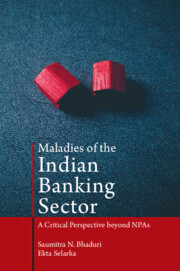Book contents
- Frontmatter
- Dedication
- Contents
- List of Figures
- List of Tables
- Foreword
- Acknowledgements
- 1 Prologue
- 2 The Indian Banking Sector: A Brief History
- 3 The Index of Credit Allocative Efficiency
- 4 Macroeconomic Analyses of Bank Credit Misallocation in the Indian Corporate Sector: Investigation of Pro-cyclicality
- 5 Determinants of Bank Credit Misallocation: Firm-level Analysis
- 6 Allocative Efficiency of Bank Credit and Firm Performance
- 7 Credit Reallocation by Indian Banks in the Aftermath of the Global Financial Crisis
- 8 The Zombie Story: Credit Boom and the Rise of Zombie Firms in the Indian Economy
- 9 Epilogue
- Bibliography
- Index
9 - Epilogue
Published online by Cambridge University Press: 27 September 2022
- Frontmatter
- Dedication
- Contents
- List of Figures
- List of Tables
- Foreword
- Acknowledgements
- 1 Prologue
- 2 The Indian Banking Sector: A Brief History
- 3 The Index of Credit Allocative Efficiency
- 4 Macroeconomic Analyses of Bank Credit Misallocation in the Indian Corporate Sector: Investigation of Pro-cyclicality
- 5 Determinants of Bank Credit Misallocation: Firm-level Analysis
- 6 Allocative Efficiency of Bank Credit and Firm Performance
- 7 Credit Reallocation by Indian Banks in the Aftermath of the Global Financial Crisis
- 8 The Zombie Story: Credit Boom and the Rise of Zombie Firms in the Indian Economy
- 9 Epilogue
- Bibliography
- Index
Summary
Financial Market essentially involves the allocation of resources. They can be thought of as the ‘brain’ of the entire economic system, the central locus of decision-making: if they fail, not only will the sector's profit be lower than they otherwise have been, but the performance of the entire economic system may be impaired.
—Joseph E. Stiglitz, 1993In India, like in many emerging economies, banks continue as major financial intermediaries, facilitating the flow of external financing to the growing economy. Even in the post-liberalization period, the banking sector has remained the most prominent financial intermediary, contributing to nearly half of the total flow of funds to the Indian corporate sector. As of November 2020, the Indian banking system consisted of 12 public sector banks (PSBs), 22 private sector banks, 46 foreign banks, and many rural banks. In India, PSB assets accounted for the largest share in the Indian banking market, with an asset base standing at the USD 1.52 trillion. As of January 2021, credit to non-food industries stood at USD 1.44 trillion.
Despite a growing body of literature on the role of banks in easing financial constraints in the economy through capital allocation, little evidence is available on the efficacy of such allocation. Our work critically evaluates the role of the banking sector by investigating the nexus between bank credit and the efficiency of its allocation. Furthermore, by identifying the borrowing exuberance (BE) phenomenon during the credit boom period, we also provide the economic consequences of credit misallocation. In other words, we intend to examine one of the fundamental roles of the banks to efficiently allocate capital by delivering it to the most significant segment of the economy while withdrawing from underperforming ones. The topic gains particular relevance in the context of the recent crisis in the banking sector. Notably, one of the significant challenges faced by banks in recent times is the mounting burden of non-performing assets (NPAs).
There has been a continuous rise in the amount of NPAs over the decades in the Indian economy. The severity of the NPA problem is apparent as the ratio of NPAs to total advances in the economy increased from 2.5 per cent in 2010 to 11.5 per cent in March 2018, thereby eroding the capital base of the banks and drying up the credit availability in the market.
- Type
- Chapter
- Information
- Maladies of the Indian Banking SectorA Critical Perspective beyond NPAs, pp. 184 - 207Publisher: Cambridge University PressPrint publication year: 2022



